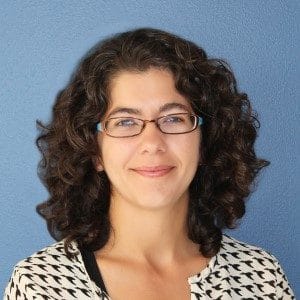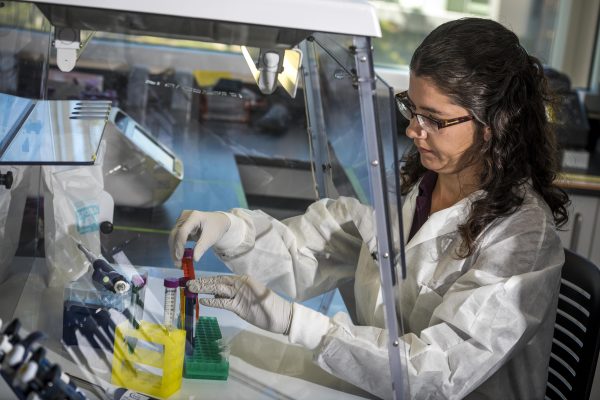Fairness First blog
Researchers voices in health equity
The Fairness First blog represents a space where researchers share with the broader community why health equity research matters to them, how do they connect to health equity, and what is the value of community engagement in the research process.
March 1, 2022
Gut microbiome:
Finding its connection to disease and health equity with Emily Cope
Associate Professor, Department of Biological Sciences

Emily Cope earned her BS and PhD at Northern Arizona University. For her PhD, mentored by Dr. Jeff Leid, she studied the role of biofilms and the microbiome in sinus disease in people exposed to secondhand tobacco smoke.
Following that, she did her postdoctoral work with Drs. Susan Lynch, Andrew Goldberg, and Steven Pletcher at the University of California San Francisco (UCSF), where she furthered the understanding of respiratory microbiome in people with chronic sinusitis (CRS), asthma, and cystic fibrosis.
She formed great working relationships with the team at UCSF and continues to collaborate with them today.
With the support of the Flinn Foundation and a SHERC pilot grant, she is working on targeted manipulation of the gut microbiome to improve asthma outcomes and health disparities.
Recently, she has entered the field of Alzheimer’s disease, where she and a team of scientists are measuring how the microbes in the gut change during development of certain features of Alzheimer’s disease.
Q. How would you describe your research and why it matters?
A. We’re covered in microorganisms like bacteria, fungi, and viruses. If you counted all of the microbial cells that live in and on us, and all of the human cells that make up our bodies, they’d be about equal. We refer to this collectively as the human microbiome.
Our microbiomes play an important role in our health by educating our immune system and digesting foods that our human cells can’t use, like dietary fibers. In my lab, we try to figure out how our microbes that live in the airways and gut drive health and disease, specifically in chronic rhinosinusitis (CRS), asthma, and Alzheimer’s disease.
Our lab works with fantastic clinician-scientists that allow us to research where basic science and clinical care overlap. Every day, we’re learning more and more about how our microbes interact with the host (us), and eventually, we would like to use the microbiome to help improve human health and address health disparities* in these diseases.
*health disparities are differences in disease and opportunities for health between populations that come from broader social inequities
Q. Tell us about a moment in your life when you decided, “This is the type of research I want to do!”
A. I entered my undergraduate education thinking that I wanted to be a veterinarian. How wrong I was! I wholly dislike seeing animals in distress, so it’s a good thing that I used my undergraduate degree to explore other areas to apply my interest in science. I took an introductory microbiology course (BIO 205) with Dr. Jeff Leid, and that course really piqued my interest in microorganisms.
I was fortunate to get involved in research in Dr. Leid’s laboratory where my love for research was ignited.

Of course, there are challenges, failed experiments, rejected grants and papers, but there are also meaningful successes too. I don’t think the 8-year-old version of me, who was in love with nature and animals, would have imagined that I would get to make a positive health impact on human health by understanding our resident microorganisms.
Q. What is the element of “unfairness” or “inequity” in the issue you are examining (in the broad context of health and wellbeing)?
A. Health inequities exist in CRS, asthma, and Alzheimer’s disease. The steady increase in asthma in the US population since the 1980s suggests that environmental factors, such as diet, may contribute to this disease.
We believe that gut microbial metabolism of dietary fibers can reduce the inflammation often seen in childhood asthma. Asthma is an important issue in the US, especially in low-income urban areas where health disparities are more likely to exist.
For example, living in a poor-urban area is an individual risk factor for reporting an asthma attack and having higher odds for an asthma-related visit to the emergency department. Individuals who live in poor-urban areas also experience a nutritional health disparity, with low fiber diets.
Q. How do you see your work helping to push the needle on this issue towards “fairness” or “equity”?
A. We hope to use the microbiome to address equity in healthcare. Our goal is to develop interventions that target the microbiome that are accessible and culturally acceptable for all populations.
The microbiome is an exciting target for the diseases we study in my lab, because it’s relatively easy to manipulate [compared to the human genome], reversible if need be, and can impact a lot of factors related to our health.
There are a lot of opportunities in this field, and we’re just beginning to understand how our microbes can impact us and how we can target these wonderful tiny organisms to improve health for everyone.
Q. How do you want your research to make a difference or change in this world?
A. I would like to see our work on fiber intervention expand and lead to a better understanding of how microbes in the gut can influence inflammation at other body sites, such as the sinuses and lungs. As a scientist, I’m extremely interested in “how” things work.
Is more dietary fiber, or a certain probiotic [a live microorganism that benefits the host], going to be the right answer in all situations? No. So we need to continue to make progress on the basic science side so that we can apply that knowledge to clinical care.
Q. What is one important lesson you’ve learned about yourself and this region through your research?
A. I’ve been privileged to have support from SHERC to achieve our goals of advancing research to address health disparities in asthma. Prior to coming to NAU, I don’t think I realized the extent of health inequity that exists in the Southwest.
I have so much respect for the different cultures across our region, and hope to learn from residents across the Southwest, especially our Indigenous neighbors, to improve health outcomes.
You can connect with Dr. Emily Cope at Emily.Cope@nau.edu to learn more about her work and potential collaboration opportunities.
Back to the main Fairness First Campaign page.